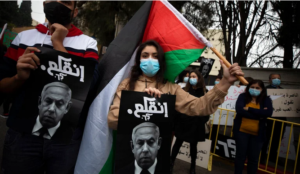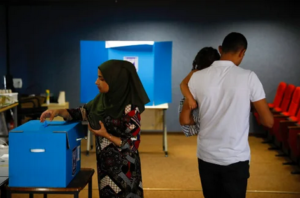Israel’s Arab voters hold Netanyahu’s fate in their hands. But there’s a big catch

Palestinian citizens of Israel protest then-Israeli Prime Minister Benjamin Netanyahu visiting the northern Arab city of Nazareth, Israel before elections in 2021
Dahlia Scheindlin writes in Haaretz on 3 October 2022:
Over coffee, a friend asked if I have any hopeful insight for the anti-Netanyahu parties in the upcoming Israeli elections, now less than a month away. When I did not, he asked glumly, “Can’t we get the Arabs to vote?”
Raviv Drucker, one of the country’s top political reporters, exhorted in Haaretz, “The change bloc must breathe hope into the Arab voters.” Most importantly, Israel’s top political satire show “A Wonderful Country” had the spoof-news anchor, Eyal Kitzis, ask the parody Yair Lapid in its season premier if everything depends on the Arab vote. “Lapid” tried to avoid saying so explicitly, but agreed. It was funnier on air than in my rendition.
Jewish Israelis of the anti-Netanyahu persuasion seem to have belatedly discovered the special key to victory: Arab turnout. In 2021, the Israel Democracy Institute found that just under 45 percent voted in Arab localities in 2021, while national turnout stood at 67.4 percent. Now polls are predicting even worse: in the range of around 40 percent, an unprecedented low for Knesset elections.
Israelis in the anti-Bibi camp wonder why Arab citizens don’t realize that they hold the keys to redemption. They could save the country from Netanyahu, who is bad enough, but if he wins, his government might well include the Religious Zionism party, with its neo-Kahanist, fervently anti-Arab Itamar Ben Gvir.
After all, Jews, who are about 83 percent of all eligible voters (when including the tiny “other” category), turned out at approximately 72 percent last time. If Arabs showed up like Jews, goes the argument, the combined strength of the parties who specifically seek to represent them could reach a heady peak of 15 seats, like in March 2020, instead of the paltry eight they are polling at present. All this is true.
But there is something disturbing about how Israeli Jews are expressing their entitlement to Arab turnout. Many of the anti-Netanyahu camp are centrists who haven’t given much thought to the realities of Arab life in Israel. Others from the left seem oblivious as to why Palestinian citizens of Israel are not rushing to join the cause.
But Palestinian citizens have historic grievances, coalition considerations, and recent policy disappointments; all of which weigh down or even suffocate their electoral motivation. Many Jewish Israelis seem oblivious to these considerations, and expect they would jump to prevent the return of Netanyahu and the far right.
At the historic level, the collective experience of Palestinians in Israel was never structurally worse than under the Zionist left. It was Mapai (forerunner of today’s Labor) who kept them hostage from 1948 as subjects of martial law, trapped wherever they resided (after many were internally displaced), immobilized and socially decimated for approximately two decades of military rule.
The policy added little security value; but it provided a great vote-harvesting machine to the ruling Mapai as Arab citizens essentially (indirectly) sold their votes for coveted permits and benefits, the kind needed to travel to visit a family member, or access medical services, for example. Even the right-wing Herut, along with left-wing parties, submitted bills to dismantle the martial law regime well before 1966 when it formally ended.
Labor (the Alignment at that time) was in power on Land Day in 1976, when six Palestinian citizens were killed while protesting decades of land theft by the state, and again in 2000, when police killed 13 citizens protesting at the start of the second Intifada. These events generated pain but also abiding cynicism as to whether there really was a difference between the hawkish right and the historic left for Arab citizens of Israel.
Fast forward to current coalition politics. Why is the anti-Bibi crowd so sure the “Arab vote” – in any case a false monolith – will save them? Mansour Abbas, head of the Islamist Ra’am party which joined the Bennett-Lapid government, held coalition negotiations with Netanyahu in the past, and he has hinted that he could do so again.
“He’s talked with Netanyahu and with Lapid…Abbas has no problem with the secular and with the religious [political camps], from his perspective, whoever gives him more politically, he’ll go with him,” says Salwa Alinat, a lecturer at the Open University who wrote her doctoral thesis on women in the Islamic Movement in Israel.
It’s a bold pragmatist line which holds that, ceteris paribus, if Arabs want political influence, they need to be in the coalition- any coalition.
Ayman Odeh and Ahmed Tibi of the Hadash-Ta’al alliance are considered more open to joining an anti-Netanyahu coalition than the hardline nationalist Balad, but a year of attacks on Ra’am for doing so complicates things. And even if Arab parties would join, Gideon Saar, a senior figure in Benny Gantz’s National Unity party, swears he will not partner with them in a coalition.
But wait, aren’t Arab citizens excited by the new political horizons opening up after Ra’am became the first independent Arab party to join a governing coalition? I have been asked this over and over the last year by worried anti-Bibi Jews.
And in fact, polling regularly shows that Palestinian citizens in Israel support in great numbers an Arab party joining the governing coalition, even if the portion has declined over the year – still 58 percent of Arabs in the July Peace Index by Tel Aviv University supported either Raa’m or any Arab party joining the next coalition.

A woman votes in the Arab town of Kfar Manda
But many also feel disappointed by the last year – or even betrayed. For those Arab voters, Ra’am’s decision to serve a hard-right Jewish nationalist heavily associated with the settler community was not what they had in mind. The Zionist left seemed to celebrate Naftali Bennett’s moderate new image, but many Arab voters weren’t impressed, and didn’t notice or accept his overnight political rebranding.
What about achievements for the Arab community under this government, by contrast to Netanyahu’s decade of incitement? Many (not only Arab voters) noticed that the government behaved in ways that were more right –wing than its predecessor regarding the Israeli Palestinian conflict, while lulling the Biden administration to sleep on the issue. Within Israel, the government made a show of tree planting in the Negev to stymie Bedouin communities from development, as a show of force.
Ra’am did have some policy victories: the “electricity law,” passed in January, was supposed to finally to connect Arab homes to the electricity grid – many lack this most basic service due to generations of discriminatory zoning practices. Further, the new government announced big investment plans to address quality of life and crime in the community. Both look very different up close.
The investment plan didn’t provide sufficient funds for authorities to prepare detailed zoning plans for approval, writes Wajdi Khalaila, a planner who works with Sikkuy-Aufoq – an NGO advancing equality for Arabs in Israel. Without those detailed plans covering the homes off the grid, he argued, very few will benefit from the law. Families will still rig up dangerous pirate electricity lines, or lose power while their kids are studying for exams.
That didn’t stop Likud’s David Amsalem from fuming that the law was nothing less than an existential threat to the state of Israel. A centrist or left-wing Jewish Israeli might be forgiven for concluding that if the Likud hated it so much, the law was probably great for Arab citizens.
Anti-Netanyahu protesters at a bridge in Rishon Letzion, two weeks ago. Their banner reads ‘Netanyahu is dividing Israel’Credit: David Bachar
It’s understandable that the Jewish center and left in Israel crave Arab votes, but their head-scratching about Arab electoral reticence highlights the vast gulf between the lived experiences that shape Jewish and Palestinian life in Israel. Jews of all political stripes should stop and learn what their own countryfolk have been through before expecting, or even demanding, their vote.
At the same time, many Arab voters do in fact conclude that electoral participation is the only solution. Salwa Alinat said that she used to debate whether or not to vote, but “everything we’re going through, I can’t just watch from the sidelines…it’s my responsibility to vote.”
She rejected the emotional manipulation of religion and nationalism in Israeli elections. “I want a rational debate,” one that is not focused on “the messiah, the king, the personality or the savior. No! No one will save you, you need to take responsibility, the voters need to take responsibility.”
Whether Israel’s Arab voters will suspend their decades of disappointment to vote could have an enormous impact on the next government, and on Israel’s destiny itself. But they are one piece of a very crowded and still mutable Rubik’s cube – a piece that no one should take for granted.
Dahlia Scheindlin is a political scientist and public opinion expert, and a policy fellow at The Century Foundation
This article is reproduced in its entirety
